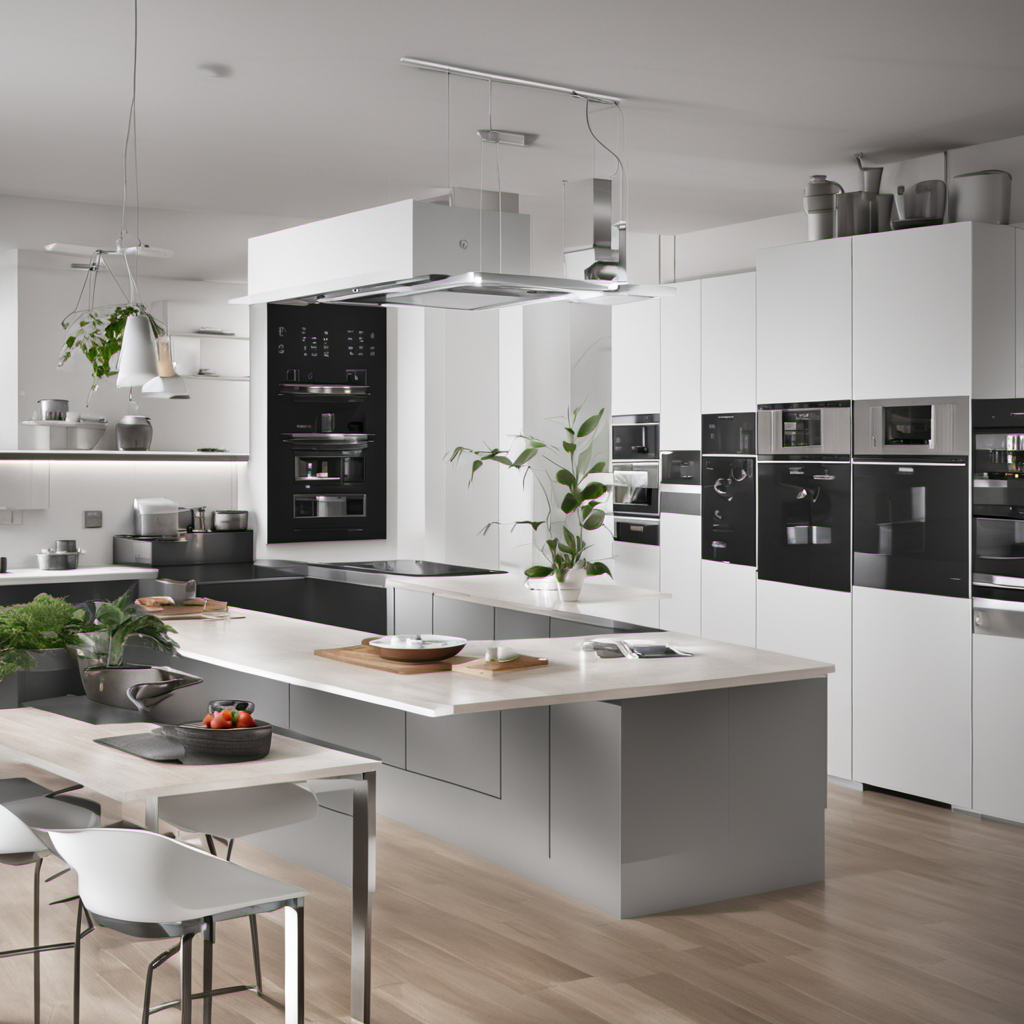Unlocking the Power: Discovering Smart Home Benefits

Smart Home Simplified
Embracing the Future of Home Technology
The rise of smart home technology is reshaping the way individuals live and interact with their homes. By integrating advanced devices and systems, homeowners can gain greater control, convenience, and efficiency in their daily lives. This shift towards automation and connectivity allows for a more seamless living experience, as functionalities are synchronized through a central system.
Smart home systems have become increasingly popular among tech-savvy beginners, who are eager to embrace innovative solutions that enhance their lifestyles. The integration of these technologies not only offers comfort but also revolutionises how individuals manage their homes.
Understanding the Benefits of a Smart Home
The advantages offered by a smart home are extensive. They encompass various aspects such as security, convenience, energy efficiency, accessibility, and cost savings. Below are key benefits that illustrate the transformative potential of adopting smart home innovations:
| Benefit | Description |
|---|---|
| Enhanced Security | Smart security systems provide real-time monitoring and alerts, helping safeguard homes. |
| Improved Convenience | Automated controls for lighting and appliances simplify daily routines. |
| Energy Efficiency | Smart thermostats and energy monitoring systems help reduce utility costs. |
| Increased Accessibility | Voice-activated controls and smart assistants enable effortless management of home devices. |
| Cost Savings | Over time, investments in smart home technology can lead to substantial financial returns. |
For more insights into specific aspects of smart homes, refer to our articles on benefits of home automation, advantages of smart home technology, and smart home features explained. Understanding these benefits can empower anyone to make informed decisions about adopting smart home technologies, ultimately enhancing their overall living experience.
Enhanced Security
Security is one of the most significant advantages of adopting smart home technology. With the rise of innovative solutions, homeowners can enhance their safety and protect their property more effectively.
Smart Security Systems
Smart security systems comprise various components designed to provide round-the-clock surveillance and protection. These systems often include smart locks, cameras, and alarm systems that can be controlled via a mobile app.
The integration of these devices allows for seamless operation and easier management of home security. Owners can monitor their property, receive real-time alerts, and even grant access to trusted visitors remotely. The convenience of controlling these systems from a smartphone enables users to respond swiftly to potential security threats.
| Feature | Benefits |
|---|---|
| Smart Locks | Keyless entry, remote access, and monitoring features |
| Security Cameras | Live streaming, motion detection, and recording |
| Alarm Systems | Instant notifications, integration with smart devices |
Remote Monitoring and Control
Remote monitoring offers peace of mind. Homeowners can check their property status at any time from anywhere in the world, using a smartphone or tablet. This capability ensures that they can keep an eye on their home while at work, on holiday, or running errands.
The ability to control security systems remotely enhances both convenience and security. For example, users can lock doors, adjust camera angles, or disarm an alarm system without needing to be physically present. Advanced systems even allow for two-way communication, enabling users to speak with visitors at their door, regardless of their location.
| Monitoring Method | Features |
|---|---|
| Mobile Apps | Access control, notifications, camera feeds |
| Web Portals | Full system management and monitoring |
| Integrated Smart Devices | Unified control through smart assistants |
The combination of smart security systems and remote monitoring capabilities contributes significantly to the overall smart home benefits. With these technologies in place, homeowners can feel secure, knowing that they have the tools to monitor and manage their security effortlessly. For more insights into the broader impacts of these solutions, visit our article on benefits of home automation.
Improved Convenience
Smart home technology offers numerous advantages that significantly enhance convenience in daily living. Two major areas of impact are smart lighting systems and automated home appliances.
Smart Lighting Systems
Smart lighting systems provide homeowners with the ability to control their lights remotely, adjust brightness, and create customised lighting schedules. These systems can be operated through smartphones, tablets, or voice-activated devices, allowing for seamless integration into everyday life.
The following table outlines some key features of smart lighting systems:
| Feature | Description |
|---|---|
| Remote Control | Control lights from anywhere |
| Scheduling | Set automated lighting schedules |
| Voice Activation | Use smart assistants to operate lights |
| Energy Monitoring | Track energy consumption |
With smart lighting, users can create the perfect atmosphere for any occasion and save energy by turning off lights remotely when not needed. For a deeper understanding of the benefits, explore our article on benefits of home automation.
Automated Home Appliances
Automated home appliances contribute to improved convenience by performing tasks that would traditionally require manual effort. These appliances include smart ovens, refrigerators, washing machines, and coffee makers that can be programmed or operated remotely.

The following table highlights some of the advantages of automated home appliances:
| Appliance Type | Convenience Feature |
|---|---|
| Smart Oven | Preheat remotely, access recipes online |
| Smart Refrigerator | Check contents without opening the door |
| Smart Washing Machine | Schedule wash cycles via an app |
| Smart Coffee Maker | Brew coffee from bed using a smartphone |
The integration of these automated appliances allows individuals to manage their household chores more efficiently, leading to significant time savings. For further details on the advantages of smart home technology, check out our article on advantages of smart home technology.
These technological advancements not only simplify tasks but also enhance the overall quality of life, making homes more comfortable and enjoyable.
Energy Efficiency
One of the standout perks of adopting smart home technology is the significant boost in energy efficiency. This section highlights two major contributors to maintaining an energy-efficient home: smart thermostats and energy monitoring systems.
Smart Thermostats
Smart thermostats are advanced devices that allow users to control their home’s heating and cooling systems from anywhere, using a smartphone or other connected devices. These devices learn user habits and preferences over time, enabling them to adjust temperatures automatically for optimal comfort and efficiency.
| Feature | Benefits |
|---|---|
| Mobile Control | Adjust heating/cooling remotely via app |
| Learning Capability | Adapts to user habits, optimizing settings |
| Energy Savings | Can decrease energy bills by up to 30% |
Smart thermostats contribute not only to comfort but also to reducing energy waste. For further insight into the advantages of smart home technology, consider exploring our article on advantages of smart home technology.
Energy Monitoring and Control
Energy monitoring systems provide valuable insights into energy consumption throughout the home. These systems track usage patterns and highlight areas where energy is being wasted, allowing users to make informed decisions about their energy consumption.
| Feature | Benefits |
|---|---|
| Real-Time Data | Enables tracking of energy use in real-time |
| Alerts | Notifies users of unusual spikes in energy usage |
| Historical Data | Helps in analysing long-term energy usage trends |
By understanding energy use patterns, individuals can alter their routines or upgrade appliances to more energy-efficient models, leading to smarter consumption. For more details on how energy management can enhance smart home advantages, check out our article on smart home technology advantages.
Implementing smart thermostats and energy monitoring systems highlights the substantial energy efficiency gains available through smart home technology, paving the way for significant cost savings over time. Explore additional benefits in our article on benefits of home automation and smart home features explained.
Increased Accessibility
As smart home technology evolves, it plays a crucial role in enhancing accessibility within the home. Two significant components contributing to this aspect are smart assistants and voice-activated controls.
Smart Assistants
Smart assistants serve as central hubs for managing various smart devices in a home. These AI-driven technologies can perform numerous tasks, from controlling lights to managing schedules. They create a seamless user experience, particularly for individuals seeking convenience in their daily routines. With their ability to understand natural language commands, smart assistants facilitate easier interaction with the smart home ecosystem.
The following table outlines some common functionalities provided by smart assistants:
| Functionality | Description |
|---|---|
| Daily Reminders | Set reminders for appointments, medications, and other daily tasks. |
| Smart Device Control | Manage various connected devices such as lights, thermostats, and cameras. |
| Information Queries | Answer questions, provide recipes, or give news updates upon request. |
| Integration with Services | Connect with music streaming, delivery, and other applications for enhanced usability. |
Voice-Activated Controls
Voice-activated controls are essential for making smart home technology more accessible to users. They allow homeowners to operate devices hands-free, making it especially beneficial for individuals with mobility challenges or those multitasking.
These controls can manage a range of devices, including lighting, heating, and even security systems through simple voice commands. The efficiency of voice-activated systems can significantly improve the overall user experience, supporting the notion of independence and convenience in daily life.
A comparison table of features found in various voice-activated control systems is shown below:
| Feature | Benefit |
|---|---|
| Hands-Free Operation | Enables users to control devices without manual input. |
| Custom Voice Commands | Users can create unique commands for specific tasks, enhancing flexibility. |
| Accessibility Options | Supports individuals with disabilities or limited mobility, increasing usability. |
Smart assistants and voice-activated controls exemplify the expanding smart home benefits. By simplifying interactions with technology, they contribute to a more inclusive and user-friendly environment, improving overall quality of life for all users. For further insights into the transformative aspects of smart home technology, explore our article on benefits of home automation.
Cost Savings
When considering the implications of smart home technology, one of the most compelling aspects is the potential for cost savings. Implementing smart devices and systems can yield both long-term financial benefits and a favourable return on investment.
Long-Term Financial Benefits
Smart home systems have a significant impact on expenses over time. By integrating various technologies, homeowners can enjoy savings in multiple areas, such as energy consumption, maintenance, and insurance premiums.
| Cost Saving Aspect | Description | Estimated Savings per Year |
|---|---|---|
| Energy Bills | Smart thermostats and appliances can reduce energy consumption. | £100 - £200 |
| Maintenance Costs | Remote monitoring can help detect issues early, reducing repair costs. | £50 - £150 |
| Home Insurance | Some insurance providers offer discounts for homes with smart security systems. | £25 - £50 |
The estimated savings can accumulate, leading to substantial financial advantages over the years. Also, the ability to control energy usage helps reduce waste, aligning with more environmentally friendly practices.
Return on Investment in Smart Home Technology
Investing in smart home technologies can enhance property value and provide a useful return on investment (ROI). As smart features become increasingly popular, homes equipped with these technologies can attract higher offers.
| Smart Home Device | Average Initial Cost | Average Increase in Home Value |
|---|---|---|
| Smart Security System | £600 | £1000 |
| Smart Thermostat | £200 | £500 |
| Smart Lighting | £150 | £300 |
The table illustrates how common smart home installations not only pay for themselves through cost savings but can also add value to the property. Homebuyers often seek properties that include modern conveniences, further enhancing the appeal of investing in this technology.
For more on the positive effects of home automation, consider visiting our articles on benefits of home automation and smart home technology advantages. Understanding the financial implications can help homeowners make informed decisions about smart home features.